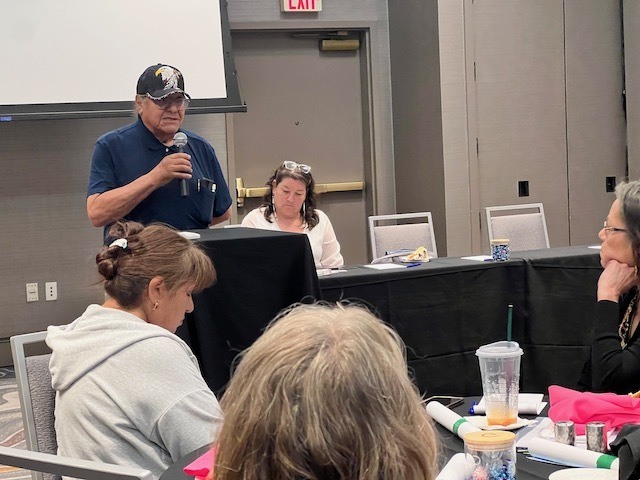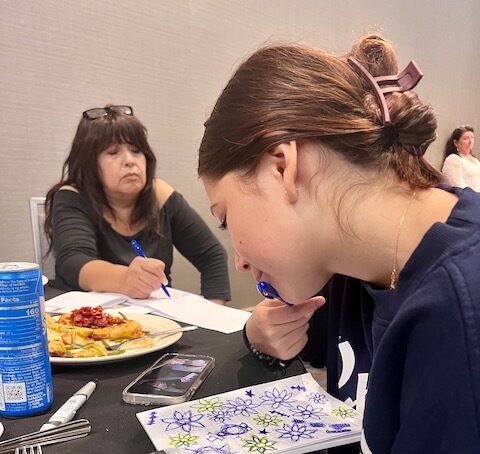
The Good Relatives Collaborative Convening was held August 3-4 in Fargo, N.D. Logo Provided by Sacred Pipe Resource Center
The Mikinaak Ode Shelter near the Turtle Mountain Reservation has been working to accommodate more than a dozen male and female clients with activities, such as making ribbon shirts and skirts.
A new community-based source of funding is helping to provide these activities as well as healthy food options. The clients eat salad with lasagna and a variety of pasta recipes, instead of plain spaghetti. “When you give the clients something to do, it gives them a little purpose. It gives them something to get excited about, other than watching TV,” said Melissa Anderson, the executive director of the shelter in Dunseith, N.D.
The Mikinaak Ode Shelter Funding is among a number of community-based organizations that have received funding from the Good Relatives Collaborative. General operating support funding from the collaborative helps remove spending barriers so nonprofits can offer a wider range of services to clients.
Native-led nonprofits participating in the Good Relatives Collaborative were among the first to respond to a Request For Proposals from the Bush Foundation. In 2021, the foundation was looking for partners to distribute grants to Native nations, as well as to Native-led nonprofits in North Dakota, South Dakota, and Minnesota.
The foundation said it aims to share power in grant-making through partners that decide on funding distribution based on their “deep understanding” of local needs.
Cheryl Kary, executive director of the Sacred Pipe Resource Center in Mandan, N.D., helps lead the collaborative, a working group of partners who focus on Native communities. The center dedicates its programs to addressing “service gaps” that tribal citizens encounter in the Mandan-Bismarck area of North Dakota.

The organization joined with the Minnesota Indigenous Business Alliance, Black Hills Community Loan Fund, and Four Bands Community Fund to form Good Relatives. Since they combined forces, they’ve been able to distribute $1.2 million from the Bush Foundation to more than 40 nonprofits.
A primary goal of the Good Relatives Collaborative mission is to provide support to help nonprofits heal their communities.“First and foremost, we need to take that competition out,” said Kary. “If we care about our communities, we want them to heal. We want them to be better. These grants kind of center that idea of healing your community and then [the foundation] trusting you to know what your community needs to heal.”
Kary said it’s important to foster a culture of mutual support among grant recipients rather than set them up to compete against each other for grant support. “What we find is that competition for resources is what destroys our Native communities basically,” said Kary. “We see organizations being slightly against each other, not cooperating, not supporting one another.”
At a recent Good Relatives Collaborative Convening held August 3-4 in Fargo, N.D., nonprofit organizers said they felt like the last to know or didn’t know how to apply for funding opportunities.
“It seems like when we go to white funding, we’re not doing it properly,” said shelter director Anderson. “Or we have to follow these guidelines that are evidence-based, but are not made for us.”

For Native-run organizations, even required paperwork is often an obstacle to obtaining funding. Sometimes funders ask for statistics that aren’t available in Indigenous communities. The language used within grant applications also can be difficult to understand for those new to nonprofits. “It’s not that we’re stupid, but we don’t have the correct documentation,” Anderson said.
The Good Relatives Collaborative can help cut through the red tape that generally comes with applying for grants so that funding vital to running nonprofits can reach otherwise underserved Native communities.
Funding from the Good Relatives Collaborative helped keep Moria Parisien, Mikinaak Ode’s lead case manager, on the job. She’s a crucial direct link between clients and the executive director.
Parisien and Anderson said a grant from the Good Relatives grantmaking has helped the shelter assist clients throughout the year. “When they come into a homeless shelter, they don’t have anything,” Parisien said. “Some of them come in with rugged shoes. Funding helps us purchase underwear, socks, and personal hygiene products such as pads and tampons.”
At the first 2023 Good Relatives Collaborative Convening, nonprofit fund recipients got together to share their stories and struggles in receiving other grants.
“Sometimes when you’re a Native-led nonprofit, you’re small, working in your community – you feel really alone. It’s like you’re the only one doing this work. This gathering was really an opportunity for the grantees to see the other people that are doing this work and are doing the same things in their community,” said Kary.
Adrianna Adame
Former Indigenous Democracy Reporter
Location: Bismarck, North Dakota
See the journalist pageTalking Circle
At Buffalo's Fire we value constructive dialogue that builds an informed Indian Country. To keep this space healthy, moderators will remove:
- Personal attacks or harassment
- Propaganda, spam, or misinformation
- Rants and off-topic proclamations
Let’s keep the fire burning with respect.
The tree features names of missing Indigenous people
Inspired by her grandparents, Tonah Fishinghawk-Chavez proves that caring for the community is an action, not just a word
The billboard project is expanding to Oregon
Identification not yet made
Dramatic play reveals power of Indigenous stories and community







